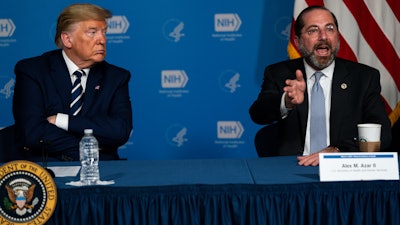
WASHINGTON (AP) — With coronavirus topping Americans' concerns, top Trump administration officials tried to switch subjects Monday by announcing final rules aimed at delivering on the unfulfilled promise of electronic health records.
It did not go smoothly as reporters veered back to the global outbreak increasingly affecting U.S. communities.
"The notion that we can't do our day jobs and work on this serious issue (coronavirus) is absurd," said a frustrated Health and Human Services Secretary Alex Azar after one reporter noted that financial markets had opened sharply lower over fears of global economic damage resulting from the outbreak.
Azar recapped administration actions to try to contain the spread of the virus here, develop tests and vaccines, work with state and local governments in areas that are seeing outbreaks, and care for those who have gotten sick.
As to the new health care technology rules, it could take several years for consumers and patients to start seeing the practical effects. The long-awaited rules are intended to get at one of the major problems with electronic health records: the systems of hospitals and doctors often don't 'talk' to each other, and patients struggle to get their medical information digitally transmitted, often defaulting to CDs and faxed paper records.
The federal government invested more than $30 billion a decade ago to help hospitals and doctors convert to computerized records. But it never solved the problems of getting the different medical systems to seamlessly interact, and of providing a pathway for patients to easily access their records. Two rules finalized by the Trump administration aim to finally fix that.
The regulations are highly complex.
One rule from the HHS agency that oversees health care technology would implement congressional requirements that hospitals and other health care entities put a stop to practices that can block the digital transfer of information. Some systems don't allow screen shots or video to be shared, for example.
Another rule, from the Centers for Medicare and Medicaid Services, tries to address access problems at the patient's level, by requiring hospitals and other health care service providers to provide access to records via software used by smartphone apps, such as the ones that already handle banking and credit card transactions. Patients could literally have access to their records via the smartphone in their back pocket.
The hope is that easier access to individuals' health care information will help prevent medical errors, cut down on duplicative tests, and make the individual patient a smarter consumer of health care services.
In addition to Azar, among the top administration officials joining to make the announcement were White House health policy chief Joe Grogan, CMS Administrator Seema Verma, and Donald Rucker, the government's National Coordinator for Health Information Technology.






















